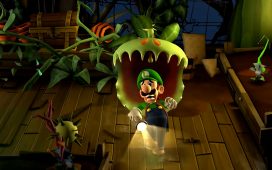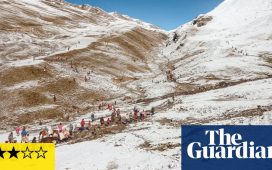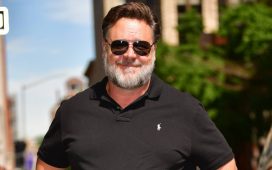The Americas with Simon Reeve is an amiable travelogue in which a dishy documentarian gads about the US. This Sunday night he was in California, examining giant redwoods and Beyoncé’s mansion. At 10pm, the credits rolled and, abruptly, BBC Two plunged us into hell.
For five minutes before the start of Live at the Apollo, the channel screened a new short film in which a masked mob hang a man in a forest. He plunges for what feels an eternity (actually 86 seconds) down a well from the wooden gibbet, before the rope stops spooling and the man – miraculously alive – slowly starts to haul his way towards the light. It was broadcast without introduction or credits. There was no clue as to who was responsible.
In fact, The Fall is the latest film by Jonathan Glazer, the British director behind gangster comedy Sexy Beast, chilly Nicole Kidman reincarnation drama Birth and Under the Skin, in which Scarlett Johansson’s erotic alien feeds on Glaswegians. All three are brilliant; Under the Skin is a masterpiece, last month named by this paper as the fourth best film of the century so far.
The Fall, his first work since Under the Skin, feels entirely of a piece. Long, eerie takes, a score by Mica Levi (there is no dialogue), bright light shining through the pitch black, and everything freighted with exhilarating dread.
Glazer, now 54, wants to be reticent about the film, to let it speak for itself. “I thought it would benefit most from being dropped unannounced,” he says. “I didn’t want to frame it with any expectation.” This is the only press he’s doing, and he’ll only answer questions by email. Yet he’s curiously fulsome, despite himself.
The Fall may be brief, but it turns out to have at least five heavyweight inspirations – the most flippant of which is a snap of Eric and Donald Trump Jr on a big-game hunting jaunt. “The day I saw a picture of the Trump sons grinning with a dead leopard,” he says, was the day he came up with a shot of the mob posing for a selfie with their prey.

It’s a moment that hauls a story, whose bare bones recall Reconstruction-era America and even stone-age justice, firmly into the present. The masks mix early man and modern social protest – half Neanderthal, half Vendetta.
“I think fear is ever-present,” says Glazer when asked if a lynch-mob mentality is currently being given freer rein. “And that drives people to irrational behaviour. A mob encourages an abdication of personal responsibility. The rise of National Socialism in Germany for instance was like a fever that took hold of people. We can see that happening again.”
Aside from The Fall, the feature-length film Glazer has been working on for the past six years is a Holocaust drama set in Auschwitz, apparently based on Martin Amis’s novel The Zone of Interest, about a Nazi officer who becomes infatuated with the camp commander’s wife. That film, due to shoot next spring, is “very much its own thing,” he says. Yet he has spoken about his fascination with photos of Germans thrilled by the horrors they were witnessing – something seemingly explored in The Fall.
Another starting point for the short, he says, was a Bertolt Brecht poem written in exile in the 1930s: “In the dark times / Will there also be singing? Yes, there will also be singing / About the dark times.” These lines, says Glazer, were inscribed on the inside cover of a collection of essays given to him by a friend.
Other inspirations include the Goya self-portrait The Sleep of Reason Produces Monsters, in which the napping artist is plagued by flapping bats, generally interpreted as a critique of Spanish society as ignorant, insane and corrupt. “Also,” says Glazer, “his Disasters of War etchings, urgently titled I Saw It or This Is Worse. Hell on earth, witnessed like a photojournalist such as Robert Capa or Don McCullin. Ferocious, factual, unflinching.”
In case it’s not clear, Glazer is an uncompromisingly serious-minded film-maker. Ask him what he’s enjoyed lately and he says Krzystof Kieślowski’s 1979 meta-drama Camera Buff (“a great film about film-making and the nature and ethics of it”). Few directors treat film of all forms with more gravity. Though this may be his first fictional short in 26 years, Glazer built his reputation with astonishing music videos for the likes of Radiohead (he credits 1996’s Street Spirit as the turning point in his artistic development) and ads such as Guinness’s horses in the surf.
“Anthony Minghella said a short film should be like a perfect sentence,” he says, “And I thought that was a really good way of thinking about them.” As for The Fall premiering on TV? Glazer won’t quite pronounce on whether some genres, such as the superhero movies made by Marvel, are – in the words of Martin Scorsese – “not cinema”.
“I believe cinema is a frontier. Absolutely. And the films I’m most interested in are the ones with that in mind.”
Food for thought. Especially for those who’d only tuned in for Live at the Apollo.
Peter Bradshaw’s verdict on The Fall

In some mysterious or post-apocalyptic forest, a group of masked figures surround their human victim, whom they have shaken down from a tree. With a noose around his neck, attached to a very long rope, he is forced to pose for a “hunt trophy” selfie and then dropped into a deep well or shaft. His tormentors gaze down into the abyss, and then saunter and dance away, apparently satisfied that he is dead. But the man has managed to brace his legs against the side of the pit and halt his fall before the rope is pulled taut around his neck, and he has survived. Now he has to climb out of there: is it a moment of desperate hope? Or another turn of the screw, another stage in the enigmatic ordeal?
Any new work from Jonathan Glazer is exciting news, and this intriguing short film – screened unannounced on the BBC – shows that he is experimenting with new modes of distribution, release and engagement. It also shows his flair for the startling and disquieting image: the sinister impassive faces; the tree shaking; and the long implacable, inhuman whine of the pulley mechanism as the body is dropped. It is all assisted by the coercively sinister score by Mica Levi.
The Fall may be a taste of a longer feature to come, or perhaps it is intended as a standalone piece: a haiku of horror in which the centrepiece is that grisly selfie – the snapshot is starkly presented – like the horrendous photos taken of grinning whites around deep south lynchings in the Jim Crow era, given a new banality-of-evil effect in the age of Instagram. Is this the way the world ends, humanity ends? In a spasm of real-world bullying and paranoia to match the pile-ons and the polarised rage of social media? Is this our fall? If it is, it is hardly a fall from grace.














